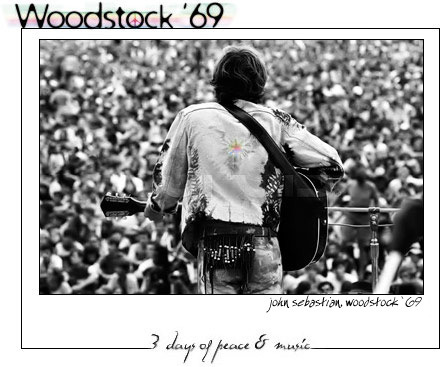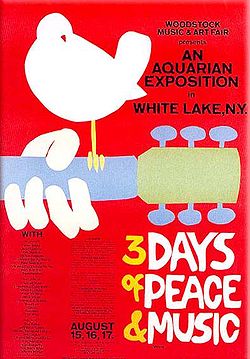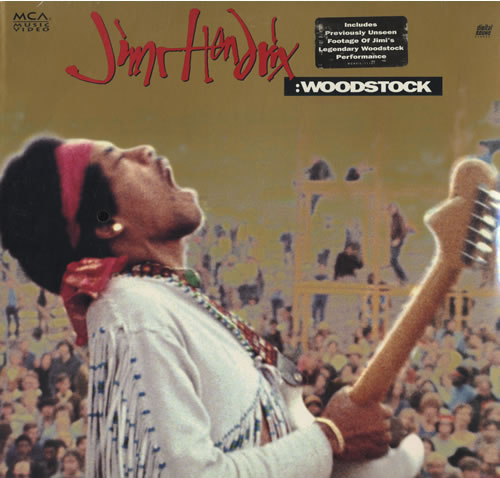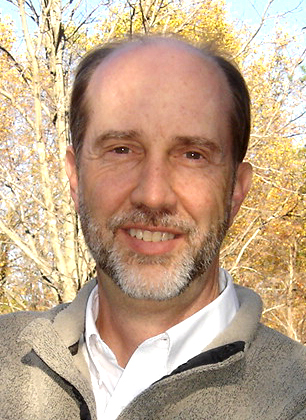|

SOME
EXCERPTS FROM OUR TRANSCRIPT
The seems
to be no disputing that part of the festive atmostphere at Woodstock was
the result of a largely unchecked flow of illegal drugs, creating scenes
that were everything from comic to troubling. Clevelander Danny Diamond
remembers one.
DIAMOND: The main thing that always attracted me, as I was there, was
the marketing techniques of quite a few of the guys – who were quite a
bit ahead of their time. Selling items like – as the one guy, dressed
up in aluminum foil. I'll never forget him. He was selling uppers, downers,
lids and reefer. And cocaine. "I got uppers, downers, lids, reefer, cocaine!"
He walked through the crowd, constantly, with that same thing. He was
selling stuff faster than you could say, "Jack Robinson."
The big-selling
item was, of course, rolling papers. People always seemed to forget about
those. Such as you're in Jamaica, or something: you pack everything, but
you don't pack up the rolling papers. That was there. You could tell the
rich kids from New York by the quality of the weed that used to go up,
into the air. There was a lot of cheap, garbage weed, but there was a
lot of real good-smellin' weed. I remember that, man! It's been since
then that I've done that stuff. It's crazy.
STAGE
ANNOUNCEMENT: Sit there. Look at all those people around you. Get acquainted.
Have a smoke. The warning that I've received – you may take it with however
many grains of salt you wish – is that the brown acid, that is circulating
around us, is not, specifically, too good. It's suggested that you do
stay away from that. 'Course, it's your own trip, so be my guest, but
please be advised that there is a warning on that one, O.K.?
INGLES:
Vivian Goodman was twenty-two, and thought she was about to take her first
acid trip at Woodstock.
VIVIAN
GOODMAN: On the way, we had met some fellows who had shown us some pills,
purported to be acid. This was a time that we were ready to experiment.
We had never dropped acid before, my friend and I. So, here we had these
pills. We thought, "Well, we're going to listen to some acid rock, we're
going to go to Woodstock." So, we bought these pills from these guys.
They wore motorcycle attire and didn't look at all savory, at all. It
turned out that these guys burned us. It wasn't acid. It was probably
nothing. I could perceive no effect, whatsoever, of it. We dropped this
so-called acid as we were waiting on Friday night. We sat there and nothing
happened and nothing happened. In the end, we were sort of glad nothing
happened, because it wasn't the place to take your first acid trip.
~~~
RON PETRAS:
Some of the houses, they set up a garden hose in the back yard and just
hooked it over a tree or a rope, and were letting people take showers
underneath it. When I said, "a shower," I don't mean just nude; I mean
with clothes on. I don't know if you're familiar, but there was red mud
up there. With all the people and all the rains, people were red from
head to toe with this mud. They'd let us wash off and clean up. Some of
the people, that had food in their houses, would give people stuff to
eat.
STAGE ANNOUNCEMENT (Wavy Gravy): There's going to be good food and we're
going to get it to you. It's not just the Hog Farm, either. It's everybody;
we're all feeding each other. We must be in Heaven, man! There is always
a little bit of Heaven in a disaster area.
PETRAS:
The Hog Farm brought in, after a couple of days, all these bologna sandwiches,
fruit and whatever they could for food. They brought in sixteen-foot box
trucks, full. They were just handing it out. There was a guy that was
walking down the street and I had a sandwich. I'd only taken a couple
of bites out of it. He said he hadn't eaten for a day, and he wanted to
know where I got the food from. I just gave it to him. It was just something
that was just normal for that. You didn't ask; whatever you had, you shared.
STAGE
ANNOUNCEMENT (Wavy Gravy): There's a guy up there, some hamburger guy,
that had his stand burned down last night. But he's still got a little
stuff left. For you people who still believe that capitalism isn't that
weird, you might want to help him out by buying a couple of hamburgers.
INGLES:
Vivian Goodman may have ended up with one of those hamburgers.
GOODMAN:
The first thing I said to my friend was, "What are we going to eat?" This
isn't untypical, for me. There were no obvious food stands, whatsoever.
There was no sign of food, really. Maybe the people were just blocking
it out: the mass of humanity. We walked up the hill. Already, the hill
was covered with people, but we found a little piece of grass and we called
it ours and we sat down. Pretty soon, you were shoulder-to-shoulder, and
we were way up the hill. This feeling that I was telling you about before,
of all being like a family, started to happen again. We talked to everybody
around us. It seemed that they were talking to everybody next to them.
It was sort of noisy, because everybody was interacting. Then, suddenly,
food came. It was being passed up, or passed down; I don't know what direction
it came from. But a hamburger passed by; pop passed by; various pipes
passed by. Everything was being passed around. There was this feeling
that you were at this great, big, family – not my family, but somebody's
family – picnic.
~~~
INGLES:
We recall a musical and emotional highlight of the festival with Ron Petras,
who was then fifteen, but definitely tuned in at Woodstock.
PETRAS:
I think one of the coolest things was when Sly Stone played, which was,
"I Want to Take You Higher." I was up at the top of the hill at the time.
You could hear the music, but it was kind of faint. Then, they started,
"I want to Take You Higher." Everybody was throwing up the peace sign
or a fist in the air (for power). That was really cool because people
on top – can you imagine? You saw the group of people. Everybody was doing
it, and everybody was yelling, "Higher!" Toward the end, you were just
pumped up, because this went on for like ten minutes or something.
INGLES:
Larry Graham was then bass man for Sly and the Family Stone.
GRAHAM:
You know how people, when they want you to come back for an encore: they
stand up, they yell. But half a million people, doing that, is really
something. I had never heard anything like that in my life! It's something
to really get the heart pumping. I'll really never forget that feeling.
We walked back out, onto the stage, and the volume of the crowd went even
higher. It was so intense! Then, we struck up, playing an encore. It was
like, wow. We just knew that was a turning point. You leave off the stage
and you go back to the trailer and you can't finish hugging each other,
you know? Jumping up and down, "Hey!!" Carrying energy back to the trailer.
That was, it turned out to be, the turning point and, really, the world,
on a large scale, became aware of Sly and the Family Stone.
~~~
INGLES:
Most, heading home after Woodstock, had a sense that they were taking
something home with them: something besides the mud on their clothes,
including Ron Petras and Vivian Goodman, who answered the question, "Do
you really think Woodstock changed you?
GOODMAN:
I think it did. Well, a number of things that happened to me then have
a lot to do with who I am now. But this thing about working together;
love, not war; peace, not striving and straining for the buck; a lot of
the sentiments in the music – but, more than anything else, the communal
feeling – I think that stayed with me. And the feeling that, if I'm going
to do something in my life, it's not going to be just for a paycheck,
just to get ahead, but it's going to, maybe, be to make a better life
for person next to me. Some of that grew out of that feeling at Woodstock.
I think it did.
PETRAS:
There was a guy, on top of the hill, by the concession stands. There was
like two foot of mud. He was a mime, I would say. He was just acting out
roles. We were up there for about an hour, maybe more, watching this guy.
This guy was so talented, so good. At first, you thought, "who's this
yo-yo, rolling around in the mud?" But then, you saw what he was doing.
He was boxing with another guy, wrestling, surfing, doing all these different
acts. You'd swear that there was an invisible person, this guy was so
good. When he got hit, he'd shake back in the mud. This guy was covered,
from head to toe, with this mud, and I mean, it was thick. You just think
back: he had no problem with going out, showing his talents, and being
himself. People really enjoyed that. I think just that, alone, where you
remember people, being themselves, makes you think, "What can I do to
just be myself and relax? I know not all people will like me, but I hope
some do." There was a lot of that there; I try to remember that, as much
as possible, so I don't start pointing my finger at other people, saying,
"You're not right; you're not good."
(c) 2009
- Paul Ingles / Cedar Creek Studios, Inc.
|



